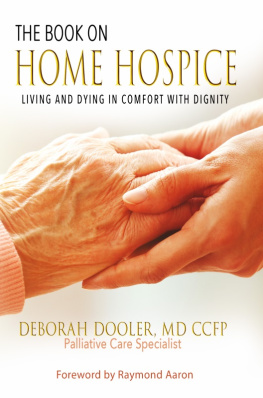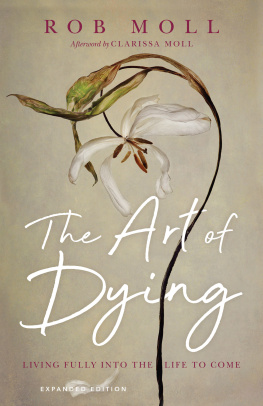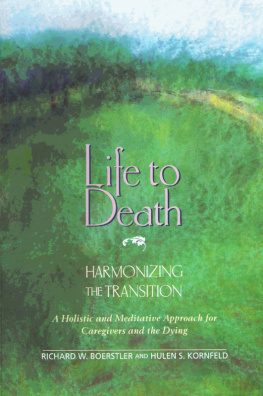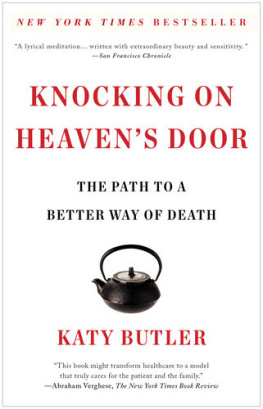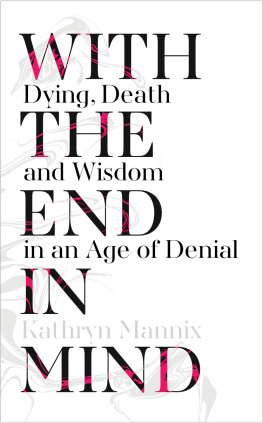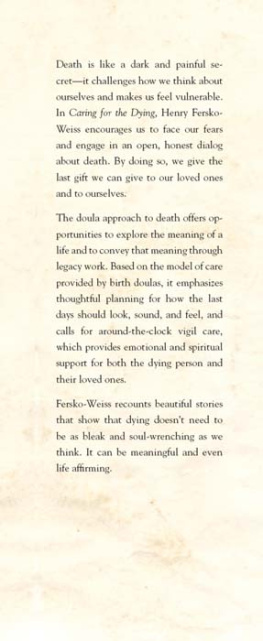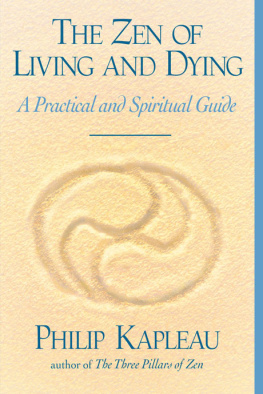The Divine Art of Dying is a magnificent achievement. Beautifully written, it is a moving and inspiring book about taking control of your life as it starts to come to a close.
Will Schwalbe, author of the New York Times bestselling The End of Your Life Book Club
This book is like wise hands extended to those dealing with death. Speerstra shares the skillful means and open heart necessary to survive the common miracle of death with a grace we might call divine.
Stephen and Ondrea Levine, authors of Who Dies?: An Investigation of Conscious Living and Conscious Dying
A profound and practical guide to the art of living well while dying and of helping others do the same. Both authors are compassionate and skillful guides into another country.
Mary Pipher, author of Another Country and The Green Boat
Fortunately, one can now take lifes final exam with an open book and the answer to mortalitys question can be found within the pages of The Divine Art of Dying. How then shall we live? Fully. Intentionally. Attentively. Lovingly.
Ira Byock, MD, bestselling author of Dying Well: Peace and Possibilities at the End of Life
The Divine Art of Dying, like the ancient Tibetan Book of the Dead, is a wise and compassionate guide to how we may travel the last stage of the human journey with grace. It will be in my knapsack when I traverse that unknown country from which no traveler returns.
Sam Keen, lecturer and author of the classic book Fire in the Belly and In the Absence of God: Dwelling in the Presence of the Sacred
This incredibly eyes-wide-open comforting and informative and inspiring guidebook recasts anticipation of imminent death into an awakened celebration of life for the dying person and her or his companions. I feel the wiser for having read it. An important book for everyone in the family of life!
Sylvia Boorstein, author of Happiness is An Inside Job: Practicing for a Joyful Life
This book does a great service by taking us to and through the point at which death is no longer an abstraction. From concrete suggestions for caregivers to the ramifications of mundane decisions, such as getting a chair for the shower, to spiritual questions, the authors give us hope. As Karen Speerstra writes, All this is not easy, but it is, at some mysterious level, profound.
Sheila Himmel, coauthor of Changing the Way We Die: Compassionate End-of-Life Care and the Hospice Movement
Every aspect of life holds the possibility of an experience with the divine: birth, youth, marriage, middle age, and, according to Karen Speerstra and Herbert Anderson, even death. Or to be more precise, particularly death. The Divine Art of Dying is a book filled with hope, about an area where we often see no hope.
William R. White, author of In Over Our Heads: Meditations on Grace
In this wise, compassionate, and deeply sensitive new work, Karen Speerstra and Herbert Anderson succeed at framing death not as an intruder to be feared but as a natural even beautiful part of what it means to be human. To anyone engaged in the end of life, The Divine Art of Dying is unforgettable and essential reading.
Mark Glubke, LPC, grief counselor, Kalamazoo, Michigan
In my work in hospice and experience of my own life, I have learned that when we are open to living and dying consciously, more awake and aware, the grace and gifts are astounding. In The Divine Art of Dying, Karen and Herbert invite readers into that grace. Blessed be the invitation they are extending.
Sarah Johnson, former hospice nurse and chaplain; leadership consultant
The Divine Art of Dying is an amazing project. Filled with powerful, transparent imagery, Ms. Speerstras journal reflections are remarkably insightful, a testament to an articulate, honest, and spiritual woman. It will touch many, many lives living and dying with grace and wisdom, just as it has mine.
James Warnock, BCC, palliative care chaplain, Napa Hospital, Napa, California
This is a book that needed to be written. It is a deep well of spiritual support for those at the end of life as well as the people who love and care for them, filled with compassion and the authentic wisdom that comes from living with the reality of impending death. We can all benefit from this truth-telling about dying gracefully when our time comes.
Gretchen Brauer-Rieke, certified Advance Care Planning facilitator, Portland, Oregon
I was particularly grateful to be reminded of the paradox and ambiguity inherent in preparing for death and think that many people could be greatly comforted by having that articulated.
Louise Kaye, retired gerontology physician, Sydney, Australia
The text, both the scholarly and the anecdotal, reads as a buffet of information for the voracious reader anxious to be fed. This is a rich book that does not try to replicate any of the great texts on death but shows a respect for them.
Sally Thomas, former hospice nurse; spiritual director trainee, Denver, Colorado
Speerstra and Anderson have deftly done what few manage coauthor a book that integrates personal experience with solid research and sound theological reflection in a cohesive and compassionate guide for others to explore the choices that come with end-of-life decisions. It is neither prescriptive nor capricious; rather, it preserves space for authentic soul-searching. Theirs is a courageous offering to others who find themselves in the crucible of life-limiting illness.
The Very Reverend Dr. Steven L. Thomason, MD, Dean and Rector, Saint Marks Episcopal Cathedral, Seattle, Washington
Karen and Herbs book gives us all both a practical and spiritual guide to the process of living as we are dying. They define the considerations needed as we move into final stages of our lives considerations that outline our wishes and relieve family members of difficult decisions as our death approaches. And as they outline those considerations, they gently explore the emotional and spiritual mysteries that accompany approaching our death.
Penny Hauser, psychiatric nurse (ret.), Las Vegas, Nevada
By flipping the death paradigm from one of failure and loss to one of natural inevitability, Speerstra and Anderson prep the reader to do the necessary and empowering work needed to achieve a good death in America.
Dr. Jessica Nutik Zitter, palliative care physician; frequent contributor to the San Francisco Chronicle and New York Times; author of forthcoming book on end-of-life issues
For me, an avid rower and sculler, the cover image of a small boat carrying us on our own particular journey (sometimes journalized) of life and dying is particularly evocative. The combined voices of the coauthors provide a remarkably insightful and touching book, including a final textual glimpse of the symbolic boat at the ending. This book should be welcomed by all of us as we anticipate our own dying and for those of us as clinicians, clergy, hospice staff, and family members who will be energized by its reading.
E. K. Rynearson MD, Clinical Professor of Psychiatry, University of Washington
Our interfaith hospice choir has been singing music of comfort in hospice settings multiple times each week since 2008. The Divine Art of Dying is a grace-filled balance of direct, honest, personal testimony and insightful spiritual observations on the process of living and dying. It will be wonderful accompaniment to our singing for patients and their families in their end-of-life situations.
Lynne and Paul Rahmeier, Sounds of Grace (www.soundsofgrace.org), Winchester, Massachusetts
Through soul-baring reflections and thoughtful analysis, this book dives into the sacred depths of the dying experience with subtlety and grace. A widely accessible resource for anyone facing end-of-life issues and the messy, terrible, ambiguous, and wondrous aspects of the dying process. I am deeply grateful for the kind of courage and love it takes to bring a book like this to life.
Next page


